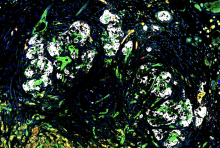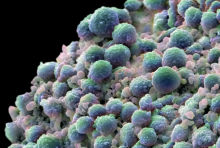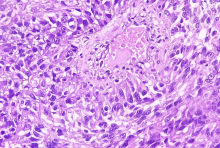Three Weill Cornell Medicine scientists were honored this week with the Presidential Early Career Award for Scientists and Engineers, the U.S. government’s highest commendation for outstanding early-career scientists and engineers.

Islet Transplantation with Blood Vessel Cells Shows Promise to Treat Type 1 Diabetes
February 22, 2025
Adding engineered human blood vessel-forming cells to islet transplants boosted the survival of the insulin-producing cells and reversed diabetes in a preclinical study led by Weill Cornell Medicine investigators. The new approach, which requires further development and testing, could someday enable the much wider use of islet transplants to cure diabetes.

Two EIPM Faculty Members Elected to ASCI
February 12, 2025
Two Weill Cornell Medicine physician-scientists, Dr. Niroshana Anandasabapathy and Dr. Rohit Chandwani, have been elected members of the American Society for Clinical Investigation (ASCI) for 2025.

Mapping of Specialized Blood Vessel Cells May Lead to Diabetes Treatments
February 8, 2025
The distinct population of endothelial cells that line blood vessels in the insulin-producing “islets” of the human pancreas have been notoriously difficult to study, but Weill Cornell Medicine investigators have now succeeded in comprehensively detailing the unique characteristics of these cells. The resulting atlas advances basic research on the biology of the pancreas and could lead to new treatment strategies for diabetes and other pancreatic diseases.



January 2025 EIPM Director's Memo
January 1, 2025
Dear Members of the Englander Institute,
I hope everyone enjoyed the holiday season had a chance to reconnect with family and friends, and refresh yourselves for the year ahead.

EIPM's Fourth Quarter 2024 External Newsletter!
December 31, 2024
EIPM's Fourth Quarter 2024 External Newsletter
December 31, 2024

Putting the Brakes on Prostate Cancer Cells
December 16, 2024
Prostate cancer hijacks the normal prostate’s growth regulation program to release the brakes and grow freely, according to Weill Cornell Medicine researchers. The discovery, published Dec. 13 in Nature Communications, paves the way for new diagnostic tests to guide treatment and could also help drug developers identify novel ways to stop the disease.

Finding Innovative Ways to Address Kidney Cancer Leads to DoD Grant
December 10, 2024
Weill Cornell Medicine has received a $1.4 million, four-year grant from the U.S. Department of Defense to investigate a new therapeutic approach for the most common form of kidney cancer.

Landmark AI Project Harnesses Voice to Diagnose Disease, Releases First Data
December 2, 2024
Researchers at USF Health and Weill Cornell Medicine, as part of an expansive, multi-institutional project investigating voice as a biomarker for disease, have reached a significant milestone by publishing the first version of their clinically validated voice dataset to an online artificial intelligence platform where it will be an invaluable resource for researchers across the globe.

